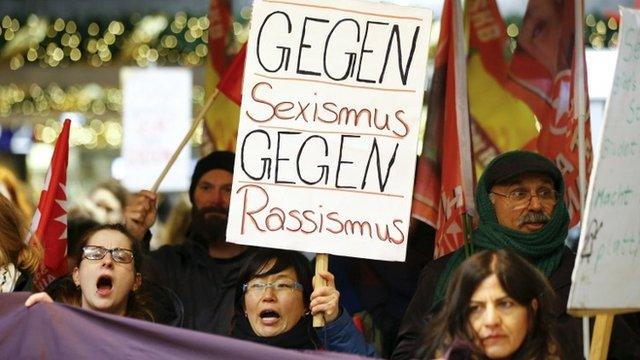Cologne attacks: Merkel proposes tougher migrant laws
- Published
Anna Holligan reports from the scene of the demonstrations
German Chancellor Angela Merkel has proposed changes to make it easier to deport asylum-seekers who commit crimes, after the New Year's Eve sex attacks on women in Cologne.
The attacks, which victims say were carried out by men of North African and Arab appearance, have called into question her open-door migrant policy.
The police's handling of the events has also been sharply criticised.
Later, there were clashes at an anti-immigrant protest in Cologne.
Police used water cannon and pepper spray to disperse protesters from the the right-wing anti-immigrant Pegida movement as violence flared after a rally which heard condemnation of Mrs Merkel's policies.
Reports say bottles and firecrackers were hurled at police lines.
Women describe 'terrible' assaults
Cologne mayor's 'code of conduct' attacked
Saturday also saw protests by feminist groups over violence against women in the city, and a left-wing anti-Pegida counter-demonstration.
Meanwhile, police in Cologne have said the number of cases of reported violence on New Year's Eve has risen substantially.
'Consequences'
Mrs Merkel, speaking after a meeting of her Christian Democrat party leadership in Mainz, proposed tightening the law on denying the right of asylum for those who have committed crimes.
Under the new plans, those on probation could be deported too.
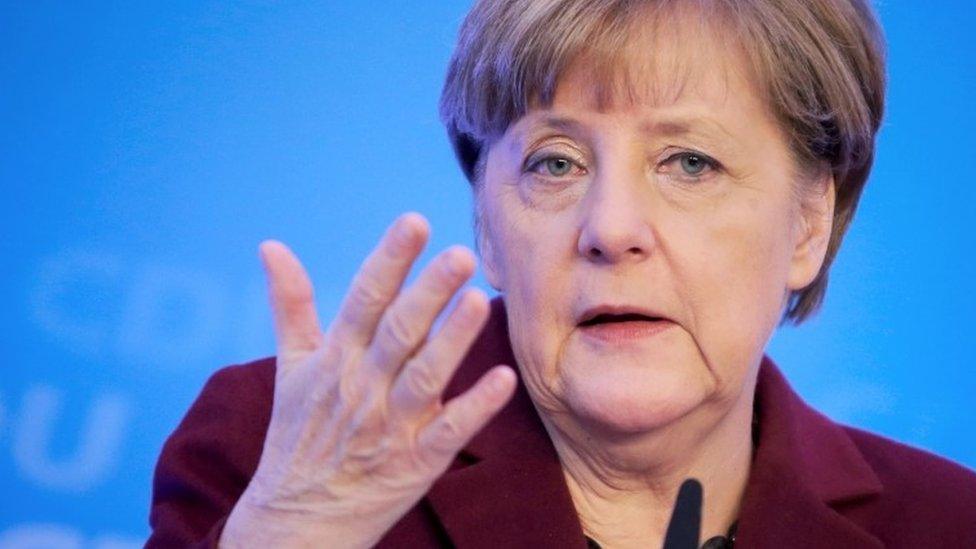
The refugee policy has come to define Mrs Merkel's leadership
"When crimes are committed, and people place themselves outside the law... there must be consequences," she told reporters after the meeting.
Under current German laws, asylum seekers are only forcibly sent back if they have been sentenced to at least three years' imprisonment, and providing their lives are not at risk in their countries of origin.
The move, which will still need parliamentary approval, follows the New Year's Eve attacks, which sparked outrage in Germany.
Victims described chaos as dozens of sexual assaults and robberies were carried out with little apparent response from the authorities around Cologne station.
A statement issued by Cologne police on Saturday, quoted by AFP news agency, said the number of reported violence cases had reached 379 - 40% of which were cases of sexual assault.
"Those in focus of criminal police investigations are mostly people from North African countries. The majority of them are asylum-seekers and people who are in Germany illegally," the statement says.

Merkel under pressure - BBC's Anna Holligan in Cologne
Angela Merkel's challenge is to reassure an increasingly pessimistic public that she has a long-term plan. The chancellor showed compassion when she welcomed more than a million refugees and migrants into Germany in 2015. Now she is under pressure to make clear there are limits to German tolerance.
Anti-immigration campaigners have seized on the Cologne incident as an example of what they see as the failure of the country's asylum policy. The prominence of the far-right Pegida movement was fading. It is now using the attacks as a propaganda tool.
On the other side of what is a widening chasm, established Islamic groups here have expressed fears that the actions of a few may jeopardise the future of many.
With tension rising and tolerance waning, Germany's doors remain open, but many here are increasingly asking: For how long and at what cost?

Germany has accepted more than a million migrants and refugees in the past year.
Officials have warned that anti-immigrant groups have been trying to use the attacks to stir up hatred.
"Twenty or 30 men surrounded us and we couldn't even move anymore"
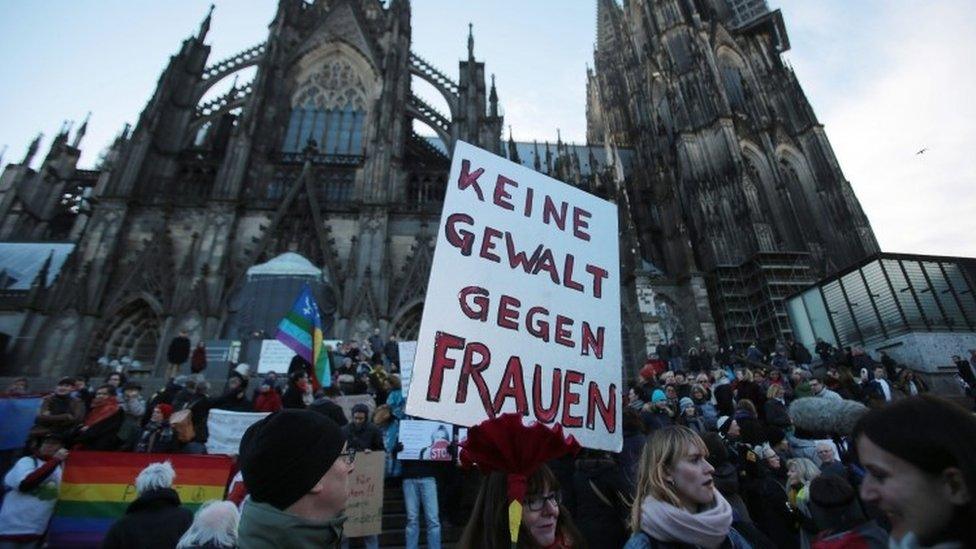
Left-wing groups have also protested about violence against women

Sales of pepper spray have reportedly risen
Similar attacks to those seen in Cologne were also reported in Hamburg and in Stuttgart on New Year's Eve. In Bielefeld, hundreds of men tried to force their way into nightclubs, Die Welt reports , external(in German).
Police said several women had alleged sexual assault.
On Friday, the chief of police for North Rhine-Westphalia was suspended. Wolfgang Albers had been accused of holding back information about the attacks, in particular about the origin of the suspects.
Peter Sutherland, the UN Special Representative for Migration, said Mrs Merkel's latest move seemed "entirely appropriate".
He added: "The full application of the criminal law against those who behave in the way that has apparently taken place is appropriate, and they should not be entitled to asylum.
"However, on the other hand, one must not overreact against a whole category of people."
- Published7 January 2016

- Published8 January 2016
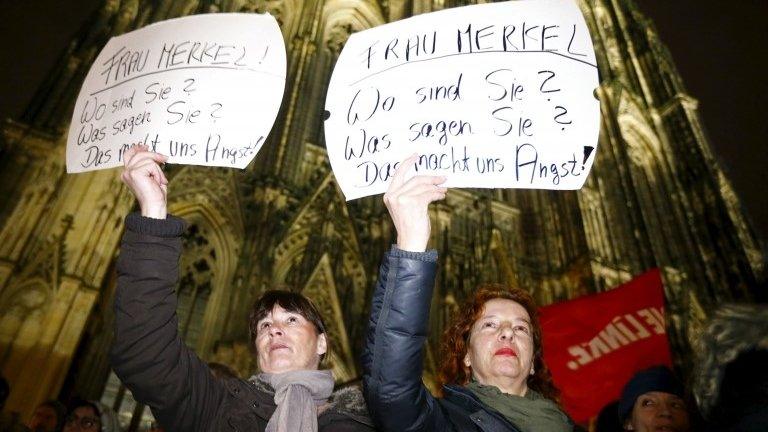
- Published6 January 2016
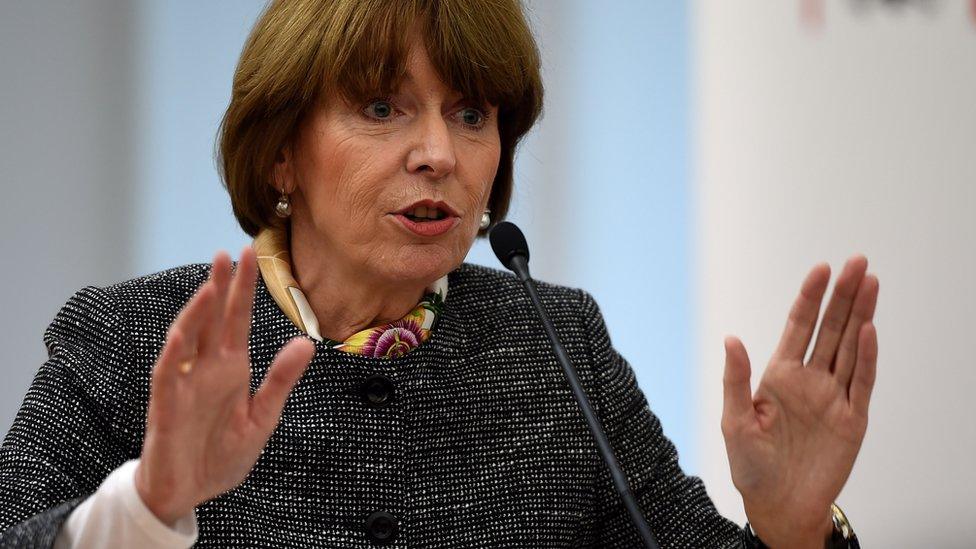
- Published6 January 2016

- Published5 January 2016
